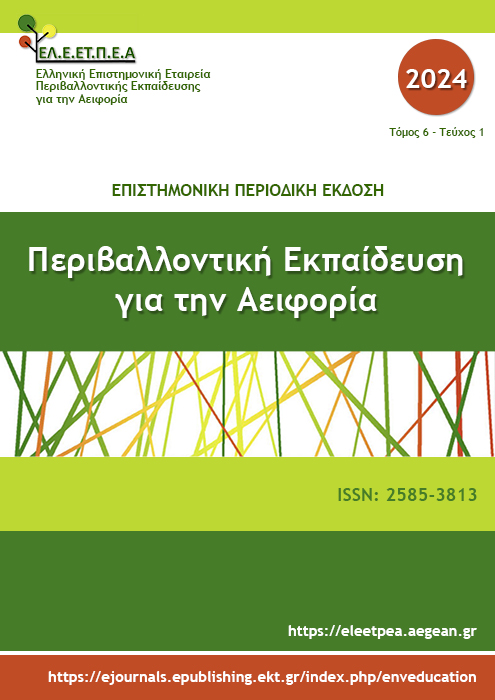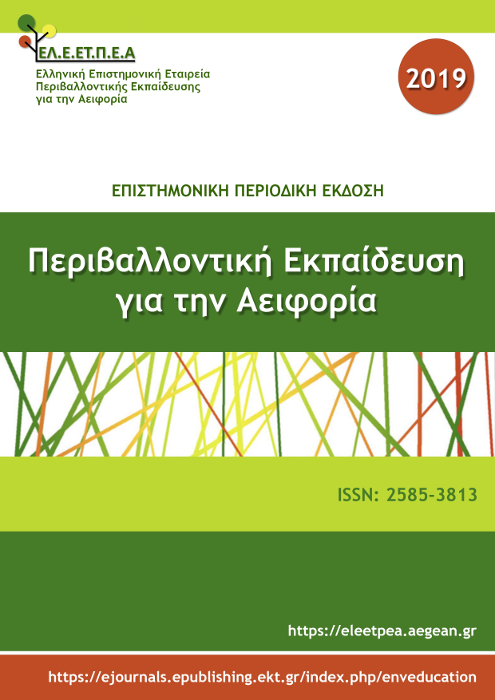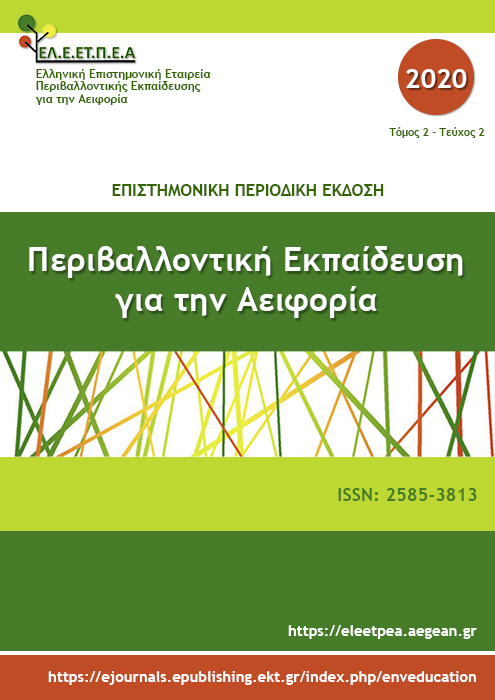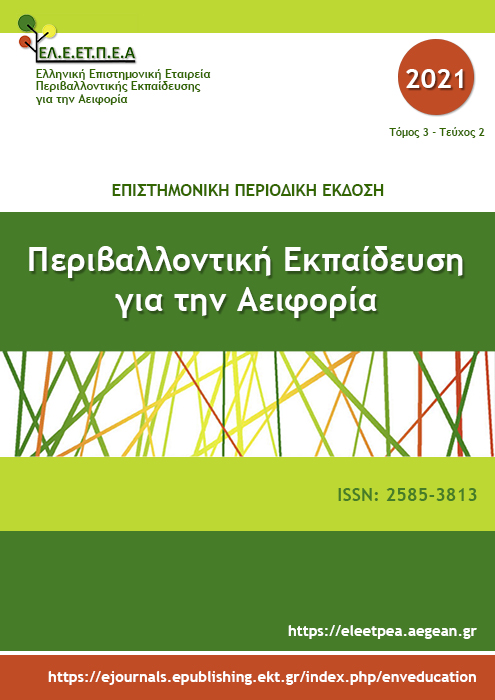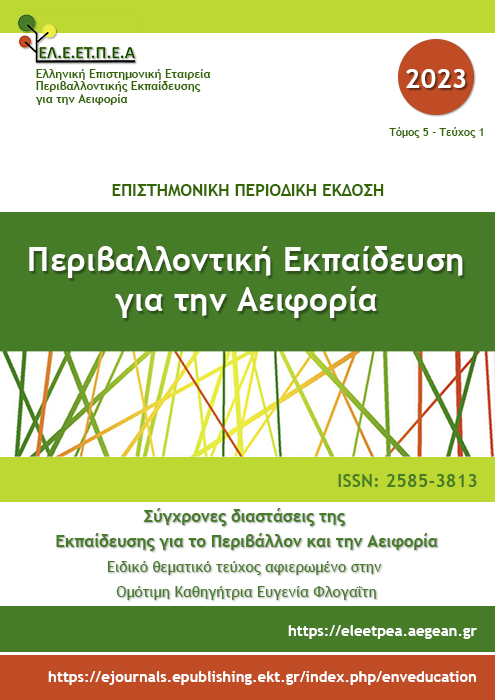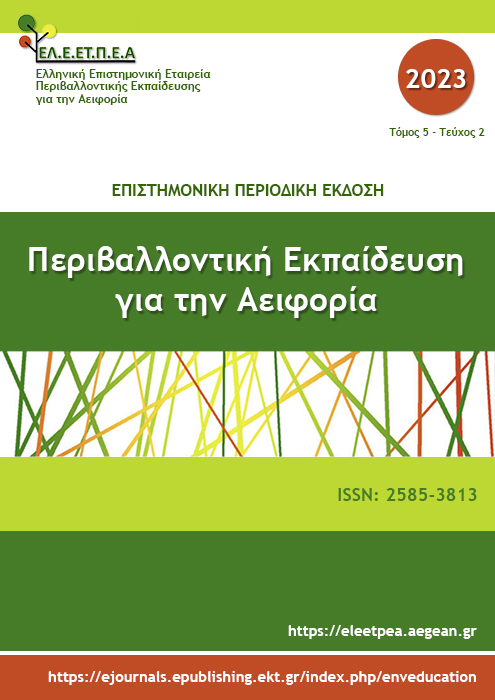Όταν τα παιχνίδια «ανακυκλώνουν» τα παιδιά σχολιάζουν. Έννοια και σημασία της ανακύκλωσης για μαθητές/τριες πρωτοβάθμιας εκπαίδευσης μέσα από και με βάση την εμπλοκή τους με θεματικά προσανατολισμένα ψηφιακά παιχνίδια
Resumen
Τα τελευταία χρόνια αυξανόμενος είναι ο αριθμός των ερευνών που επικεντρώνεται στην ένταξη και αξιοποίηση των ψηφιακών παιχνιδιών ως εκπαιδευτικών εργαλείων στην Περιβαλλοντική Εκπαίδευση για την Αειφορία (ΠΕΑ). Ο ρόλος των ψηφιακών παιχνιδιών στη διαμόρφωση ενός ελκυστικού και γόνιμου εκπαιδευτικού περιβάλλοντος για την καλύτερη κατανόηση των σύνθετων περιβαλλοντικών εννοιών, φαινομένων και προβλημάτων αναγνωρίζεται διεθνώς, όπως επίσης και η συμβολή τους στην ανάπτυξη των περιβαλλοντικών γνώσεων και στάσεων μαθητών/τριών και στην προώθηση της βιωματικής μάθησης. Η παρούσα έρευνα αποτελεί μία πρόταση για ενσωμάτωση ψηφιακών παιχνιδιών στην εκπαιδευτική πράξη, με σκοπό τη διερεύνηση των αντιλήψεων μαθητών/τριών της πρωτοβάθμιας εκπαίδευσης για την έννοια και το ζήτημα της ανακύκλωσης, όπως και για το περιεχόμενο των ίδιων των παιχνιδιών. Πρόκειται για μελέτη περίπτωσης, στην οποία συμμετείχαν μαθητές και μαθήτριες της πέμπτης τάξης ενός δημοτικού σχολείου παίζοντας ψηφιακά παιχνίδια για την ανακύκλωση και συζητώντας γι’ αυτά. Η έρευνα ακολούθησε μια ποιοτική μεθοδολογική προσέγγιση, με τη συλλογή των δεδομένων να βασίζεται σε ημι- δομημένες συνεντεύξεις και την ανάλυση τους σε θεματική ανάλυση. Τα αποτελέσματα δίνουν σημαντικές ενδείξεις για τους τρόπους με τους οποίους οι μαθητές αναγνωρίζουν και κατανοούν την ανακύκλωση και προσεγγίζουν τον σχεδιασμό ψηφιακών παιχνιδιών θεματικά επικεντρωμένων σε αυτή.
Article Details
- Cómo citar
-
Δασκαλάκη Ζ., & Δασκολιά Μ. (2025). Όταν τα παιχνίδια «ανακυκλώνουν» τα παιδιά σχολιάζουν. Έννοια και σημασία της ανακύκλωσης για μαθητές/τριες πρωτοβάθμιας εκπαίδευσης μέσα από και με βάση την εμπλοκή τους με θεματικά προσανατολισμένα ψηφιακά παιχνίδια. Περιβαλλοντική Εκπαίδευση για την Αειφορία, 6(1), 36–59. https://doi.org/10.12681/ees.38538
- Sección
- Articles

Esta obra está bajo una licencia internacional Creative Commons Atribución-NoComercial-CompartirIgual 4.0.
Οι συγγραφείς διατηρούν τα πνευματικά δικαιώματα και παρέχουν στο περιοδικό το δικαίωμα της πρώτης δημοσίευσης μαζί με την αδειοδότηση της εργασίας με CC-BY-NC-SA, που επιτρέπει σε άλλους να μοιράζονται αυτή την εργασία με αναγνώριση του συγγραφικού δικαιώματος και την αρχική δημοσίευση σε αυτό το περιοδικό.
